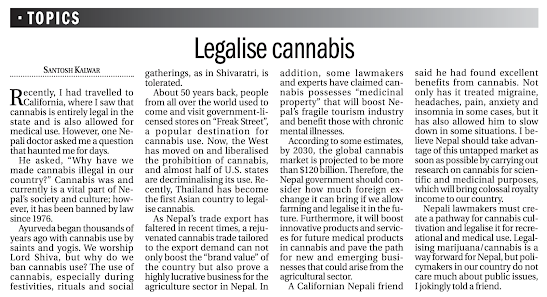He asked, "Why have we made cannabis illegal in our country?" Cannabis was and currently is a vital part of Nepal's society and culture; however, it has been banned by law since 1976.
Ayurveda began thousands of years ago with cannabis use by saints and yogis. We worship Lord Shiva, but why do we ban cannabis use? The use of cannabis, especially during festivities, rituals and social gatherings, as in Shivaratri, is tolerated.
About 50 years back, people from all over the world used to come and visit government-licensed stores on "Freak Street", a popular destination for cannabis use. Now, the West has moved on and liberalised the prohibition of cannabis, and almost half of U.S. states are decriminalising its use. Recently, Thailand has become the first Asian country to legalise cannabis.
As Nepal's trade export has faltered in recent times, a rejuvenated cannabis trade tailored to the export demand can not only boost the "brand value" of the country but also prove a highly lucrative business for the agriculture sector in Nepal. In addition, some lawmakers and experts have claimed cannabis possesses "medicinal property" that will boost Nepal's fragile tourism industry and benefit those with chronic mental illnesses.
According to some estimates, by 2030, the global cannabis market is projected to be more than $120 billion. Therefore, the Nepal government should consider how much foreign exchange it can bring if we allow farming and legalise it in the future.
Furthermore, it will boost innovative products and services for future medical products in cannabis and pave the path for new and emerging businesses that could arise from the agricultural sector.
A Californian Nepali friend said he had found excellent benefits from cannabis. Not only has it treated migraine, headaches, pain, anxiety and insomnia in some cases, but it has also allowed him to slow down in some situations. I believe Nepal should take advantage of this untapped market as soon as possible by carrying out research on cannabis for scientific and medicinal purposes, which will bring colossal royalty income to our country.
Nepali lawmakers must create a pathway for cannabis cultivation and legalise it for recreational and medical use. Legalising marijuana/cannabis is a way forward for Nepal, but policymakers in our country do not care much about public issues, I jokingly told a friend.
Published: The Himalayan Times
Nepal's leading daily newspaper
